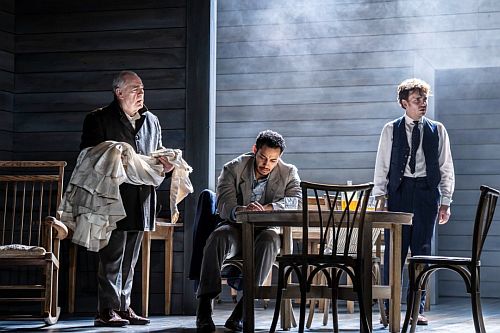
Daniel Evans and Tamara Harvey announce their arrival as the new co-directors of the Royal Shakespeare Company with a year long season of work with serious star power, bringing the RSC back into the spotlight with canny marketing campaigns that stretch as far as London luring audience members onto the train to Stratford. Emily Burns’s production of Love’s Labour’s Lost marks the start of a new era in Stratford in so many ways and much can be read into the approach taken to this revival and what that will mean for the promising year ahead. Setting out its stall with a show that is both frothy light yet with deep shade wrapped in a hugely enjoyable comedy package performed by a group of very fine young actors, there is a definite vigour and purpose in this new company that has set a high bar for the rest of the season.
Burns starts with a contemporary setting, a sometime hurdle for Shakespeare adaptations that can feel a little forced into a pointless period piece that may offer nice visuals but little substance in the morality and psychology of the play. But here there is a much clearer perspective on the layers of ingrained behaviour and entitlement that shape activities in Love’s Labour’s Lost placing the characters in a seeming haven, a retreat / luxury spa away from the political concerns and issues that shape their lives. But beneath the surface, there are class, wealth and nationality barriers that come between the characters in ways that act as subtle judgments leading to a more satisfactory conclusion to the play – Shakespeare’s original conclusion, but emphasising some of the play’s less savoury undertones and implications.
The primary commentary focuses on the relationship between the four couples who fall for each other in the few days they spend free from their wider cares. The men are scholars who reluctantly renounce women for a year to focus on their studies while the women are on a diplomatic mission to negotiate the return of some land, and while this seriousness of purpose drives the top layer of the play, the throwing off of these plans as inconvenient romance alters their intent becomes the comedy centrepiece. Burns’s approach does two quite interesting things, it gives the female characters, led by the spirited Rosaline and Princess, greater agency and self-sufficiency in the plot suggesting they may not reciprocate the ardent emotions expressed by their lovers, and then pushes the point further by making the men quite unworthy of them.
Love’s Labour’s Lost is quite a laddish play for a while with Berowne, King Ferdinand, Dumaine and Longaville party boys whose initial reluctance to forswear female company and excess in order to improve their minds is couched in ego. The group has charm but they brag and boast, assuming that all women must desire them and look to have a good time at the expense of others. And Burns draws this attitude out across the show as they use the clown Costard to set plots in motion, actively belittle and betray each other as well as treating the hotel’s largely international staff with some contempt, particularly scorning them during the Nine Worthies performance that anticipates the show’s finale. As they separately betray their vow of abstinence and reveal their secret attractions to the Princess, Rosaline, Katherine and Maria, the men club together, ready to prowl and certain they will get what they want. This is interesting work from the RSC company, placing what could be sympathetic characters in a slightly toxic light, making them seem shallow and perhaps more interested in the act of conquest than the fully-rounded women they may win.
One of the finest scenes of this interpretation uses Shakespeare’s highly comic scenario to reinforce this perspective. In overly romantic garb, dressed as knights in full metal armour performing an excruciatingly hilarious Backstreet Boys number, the four men are tricked into wooing the wrong ladies, deceived by the gifts they have sent ahead which have been secretly swapped to test their true feelings. That none of the men propose to the correct women makes perfect sense of the less edifying depiction of Berowne and his friend and the surface impression of love that they offer with its flowery verse and excessive demonstration of feeling that Burns’s production presents – how can they profess to love deeply when they cannot recognise their beloved in a crowd of four? With Shakespeare’s more ambiguous ending leaving the men ultimately unsatisfied and needing to prove their devotion, Burns’s show leaves the audience wondering if any of these not irredeemable but fairly shallow men will really remember this new vow in 12 months time.
What makes this such a successful interpretation is the equal strength of the female characters whose cool disinterest in their swains creates an aura of cynicism that suits the tone of the show. One of the ways that Shakespeare frames this story is having the men decide which lady they want and letting the ‘games’ begin, but there is never any suggestion in the text that the women necessarily desire the man that pursues them, as though they have no choice in the matter. So Burns’s production leaves plenty of room for ambiguity; perhaps they enjoy the attention or their heads are momentarily turned by the ardent verses they receive yet there is never a moment when the friends lose their hearts entirely, always conscious not only of their own personal value as a Princess and her retinue but also of the potential deception being acted upon them by young men who play at being in love. By the end, the interpretation even implies that for the women, these relationships merely passed the time or were part of a last hurrah before they return to their official political and monarchical duties.
Love’s Labour’s Lost also has two classes of character – masters and servants – who are given quite different characteristics and status in this production, largely interacting within their own groups throughout. The servants here are reimagined as hotel and spa workers, Jaquenetta a country wench becoming a maid while her beau Don Armado is the exuberant tennis coach who, along with their fellow workers, exist quite separately from the rich and pampered guests they take care of. It is subtle but adds a useful extra layer of narrative to the behaviours and divisions explored in the show, underscoring some of the entitled attitudes and thoughtlessness of Berowne’s group whose jauntiness and self-interest is nicely undercut by the suggestion of poorly paid and poorly used working characters they mock later in the story.
So while this new RSC production of Love’s Labour’s Lost is hugely entertaining there is some really interesting messaging sewn through the adaptation that slightly repositions Shakespeare’s text and draws out different contemporary resonance that takes the story through to a more poignant finale moment. This is a really strong conclusion, a sudden but successful change of tone that firmly ends the revels and takes the characters back to their real lives. As the bubble bursts, the management of these scenes is very effective, using a combination of music, lighting and performance to show how one life is shed and a new future adopted. There are quiet nods here to Henry IV and Henry V in the exploration of monarchical ceremony and persona, what it means to throw off a youthful glee and evolve rapidly into a more sober ruler. Burns’s staging of the final moment in particular is really thoughtful about the different dynamics that have worked across the play, where individual desire and satisfaction gives way to collective need and the excesses of the holiday spirit are consumed by dignity and authority that, perhaps, widens the gap between the would-be lovers even further.
In his first major leading role on stage, Luke Thompson gets to showcase the range that has underpinned his training in high-quality Shakespeare productions from Julius Caesar to Hamlet and King Lear. The comedy of Love’s Labour’s Lost and visual approach that Burns has used create opportunities for sparky word play and physical humour that Thompson manages with ease, capturing the comfortable machismo of his character, the arrogant charm that makes Berowne appealing but also overly certain of himself and his appeal to any woman he sets his sights on. Thompson’s gift as an actor has always been an ability to turn the tone of his performance in a moment and here Berowne’s applications to Rosaline are played as heartfelt and true, the brusk but witty barbs they trade leading into a sincerity of meaning beneath the florid language. And although Berowne’s protestations are not entirely believed, Thompson’s performance shows his progression across the story, a sense of his being struck and then chastened by the emotion that, of all the men in the play, has the greatest chance of lasting a year.
Ioanna Kimbrook is a very collected Rosaline, highly cynical about the relationships being formed and unwilling to betray too much of her own feeling. There are some enjoyable scenes of embarrassment on the golf course as a love letter is read out in front of her giggling companions and the comic timing of the exchange of tokens when the men profess love to the wrong person is a subplot that Rosaline orchestrates well and with clarity for the audience. A similar note of sincerity creeps into Kimbrook’s performance as Berowne’s persistence starts to make an impact, told through stolen glances, even though Rosaline is determined to remain aloof from him, and the chemistry with Thompson hints at a future Beatrice and Benedick.
Love’s Labour’s Lost is an ensemble comedy and there is great support all round from the Princess (Melanie-Joyce Bermude) and her retinue, Sarita Garbony and Amy Griffiths, taking agency from their character roles to create a collection of distinct and often very funny performances. Berowne’s pals Ferdinand (Abiola Owokonirna), Dumaine (Brandon Bassir) and Longaville (Eric Stroud) are a good match for their female counterparts and each get their chance to shine in the comedy – the Barbershop quartet of knights will certainly live long in theatre memory. Managing the diplomacy, Jordan Metcalfe’s Boyet slowly adjusts to the steamy atmosphere, ultimately representing the Princess but wanting to be one of the boys, while there is much to enjoy in Marienella Phillips role as Jacquenetta and Jack Bardoe’s excessively silly Don Armado.
Although a respect for and understanding of Shakespeare’s texts goes without saying, it is a bold start to the new management of the RSC, heralding a playfulness and willingness to innovate that will lure audiences back to Stratford once more and it is notable that the very first words spoken in this new era are not performed in English. Emily Burns’s Love’s Labour’s Lost has set a standard for the rest of this season with a zesty young cast delivering a hugely entertaining but thoughtful comedy. With more early career talent heading to Stratford including Alfred Enoch in Pericles and a much anticipated Hamlet from Luke Thallon, you may find yourself on the train to the RSC a few times in 2024.
Love’s Labour’s Lost is at the Royal Shakespeare Theatre in Stratford-Upon-Avon until 18 May with tickets from £8. Follow this site on Twitter @culturalcap1 or Facebook Cultural Capital Theatre Blog



